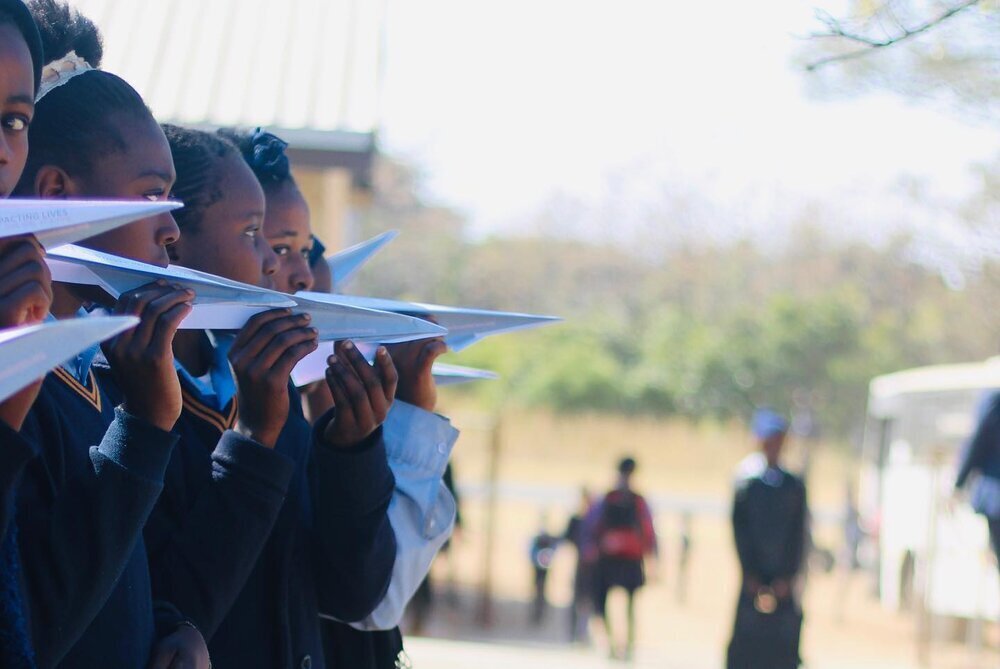South Africa’s first black female helicopter pilot helps girls reach new heights in the aviation and aerospace industry
(Courtesy of GFPA Foundation Instagram)
Historically, aviation and aerospace have been a “boys club.” Refilwe Ledwaba founded Girls Fly Programme in Africa to change that.
The first time Refilwe Ledwaba boarded an aeroplane, she made a startling discovery: there was a woman in the cockpit.
“I never thought aviation or becoming a pilot was a viable career choice for me as I have never seen anyone that looks like me following that career,” Refilwe remembers. Growing up in a small town in apartheid South Africa, there were the limited career choices for women, particularly women of colour. “When I heard a female voice in an aeroplane, that ignited my initial spark,” she says.
At the time, Refilwe was an undergraduate at the University of Cape Town and planned to become a doctor. However, after graduating with a degree in microbiology and biochemistry, she entered the workforce instead of going to medical school in order to pay off her undergraduate student loans. Refilwe’s passion for aviation led her to take a job on Comair Limited’s cabin crew team and she began taking pilot lessons on the side.
(Courtesy of Gypseenia Lion / Forbes Africa)
In 2004, Refilwe got her big break. The South African Police Service accepted her into their cadet pilot programme and she became South Africa’s first black female helicopter pilot. But there was some turbulence along the way. Breaking into a male-dominated field involved challenges like not being able to find uniforms in her size and a lack of female role models. These gender barriers in the aviation industry are not unique to South Africa — the International Society of Women Airline Pilots revealed that as of 2018, only 5.2% of pilots worldwide are women.
Hoping to improve the lack of representation in her field and expose girls in Africa to professional opportunities in STEM, Refilwe founded the organisation Girls Fly Programme in Africa (GFPA) Foundation in 2014 to make aviation and aerospace a viable and accessible career choice for girls and women across the continent.
(Courtesy of GFPA Foundation Instagram)
Through GFPA’s annual aviation and space camp, Refilwe hopes to teach young women the technical skills and emotional fortitude they need to pursue careers in STEM, where women of colour are notoriously underrepresented. The programme runs for several weeks during the summer and teaches girls how to use design thinking and technology to develop solutions to current challenges in the aviation and aerospace industry. They participate in professional development workshops and a mentorship programme, where they can learn from other GFPA alumnae and female trailblazers in related industries.
“If girls are exposed to strong, female STEM role models, a career in these fields will seem as attractive and attainable as any other, they can envision themselves in those careers,” Refilwe shares. And for many girls in the programme, Refilwe is the role model they look up to.
Refilwe Leqhotsa, a 19-year-old fixed wing and drone pilot trainee, says that GFPA and Refilwe Ledwaba changed her professional trajectory away from medicine — a career path encouraged by her parents, but not one she was interested in. “Refilwe Ledwaba has taught me a lot of things as an individual. From how to carry myself as a black female pilot, with confidence and creativity and perseverance,” she shares. “I have a lot of ideas of how to make the world a better place. She taught me not to limit myself, but to take every opportunity.”
Simamkele Mdunyelwa, an aeronautical engineering student at university, recalls the excitement of working with Refilwe during the GFPA camp. “I was one of the five girls who did simulator flying with Refilwe Ledwaba herself,” Simamkele says. “I got my very first flight experience behind the control column in an actual craft.”
(Courtesy of GFPA Foundation Instagram)
Both students shared that the typical day at GFPA’s camp is exciting and different. Whether it is learning about robotics and coding, designing drones or discussing the importance of teamwork, Refilwe Leqhotsa says girls are “pushed to think outside of the box.” She also highlights that this type of education model, rooted in “innovative design thinking,” will serve her and her peers well in their future STEM careers.
This type of in-depth training is especially important for young women, Simamkele emphasises that “Africa is an ever-growing continent” and home to the world’s fastest growing economies. “Africa has women with great potential who need to be nurtured and exposed to relevant facilities to grow their potential,” Simamkele shares. “The representation of women in aviation in Africa has shown growth yes, but it's not enough yet and so more and more women need to involve themselves in the industry to grow our continent further.”
“Africa has women with great potential who need to be nurtured and exposed to relevant facilities to grow their potential.”
It is clear that initiatives like GFPA are changing the cultural narrative. Refilwe Leqhotsa says that GFPA alumnae are no longer solely “expected to marry and focus on domestic chores,” but encouraged to learn about aerodynamics and drones. By building girls’ self-esteem through aviation, GFPA equips and empowers the next generation of women to participate in the continent’s expanding economy and ongoing tech renaissance. And through the guidance of industry pioneers like Refilwe Ledwaba, more and more girls will gain access to this invaluable learning experience, putting passion into practice.
Currently, GFPA operates camps in Botswana, Cameroon and South Africa. The next stop for Refilwe and her GFPA crew? To open fly programmes for girls in every country across the African continent.
This article uses interviews conducted by former Malala Fund editorial fellow Emma Yee Yick.
 Read more
Read more













